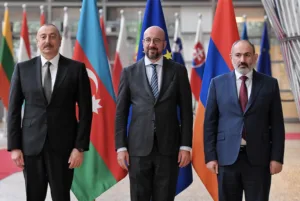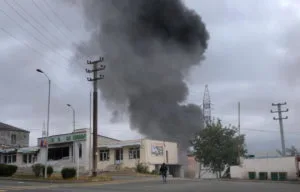Brussels -It is still difficult to say whether the conflict that has lasted over 30 years between Armenia and Azerbaijan is heading toward an end. However, the latest developments on the diplomatic front are the most positive since the end of May 2022, when the European Union stepped up efforts to bring the Armenian Premier Nikol Pashinyan and the Azerbaijani President, Ilham Aliyev closer to a final resolution of the tensions on the ground (which resulted in the fall of 2023 in the conquest of the Nagorno-Karabakh region by Baku’s army). “(I) Warmly welcome the agreement between Armenia and Azerbaijan on the 1991 Alma Ata Declaration as the basis for border delimitation between the two countries,” European Council President Charles Michel said in a post on X after the announcement of Yerevan’s return of some villages to Azerbaijan.

Saturday’s (April 20) agreement between the two former Soviet countries could constitute one of the most concrete steps toward reaching that overall peace agreement that Armenian Prime Minister Pashinyan had forecast in the Plenary of the European Parliament for late 2023. “The Republic of Armenia receives a reduction in the risks associated with border demarcation and security,” the Prime Minister’s office commented to explain the decision to return some villages — abandoned but strategically located for Russian gas transit – that Azerbaijani Foreign Ministry spokesman Aykhan Hajizada called “under occupation since the early 1990s” in a post on X (with attached map of borders). Border delimitation “based on the unequivocal recognition of the territorial integrity” of each country was “also a key element of the discussions in Brussels” in the last two years, Michel was keen to emphasize referring to the understanding signed by the border commissions: “It will serve as an essential step toward the normalization and peaceful opening of the entire region.”
While a meeting between Azerbaijani President Aliyev and the Russian autocrat Vladimir Putin on strategic partnership and regional issues is expected in the Kremlin today (April 22) – following the complete withdrawal of Russian peacekeepers from Nagorno-Karabakh – Armenia is inevitably considering a reorientation of alliances. The traditional Russian flank is being replaced with that of the European Union, the only international actor that has gone out of its way in recent months to support Yerevan in the face of exodus of the ethnic Armenian population from the self-proclaimed Republic of Artsakh (over 100,000 refugees poured into a country of 2.8 million) following its conquest by the Azerbaijani army on September 20, 2023. In addition to the disbursement of more than 30 million euros in refugee support, in early April, EU Commission President Ursula von der Leyen and the EU High Representative for Foreign Affairs and Security Policy, Josep Borrell, announced to Premier Pashinyan that they were preparing a €270 million Resilience and Growth Plan in grants for the next four years.
The conflict between Armenia and Azerbaijan
Armenia and Azerbaijan have been in a frozen war since 1992, with recurring outbreaks of armed violence centered in the breakaway region of Nagorno-Karabakh. The most serious in recent years was in October 2020: In six weeks of conflict, nearly 7,000 civilians died before the ceasefire that forced Armenia to return large portions of territory in Nagorno-Karabakh. After a year and a half, the situation heated up again because of a shooting at the border in late May 2022, which continued in parallel with the high-level talks encouraged by the EU Council President until the resumption of hostilities between Yerevan and Baku in September, with mutual accusations of the bombing of military infrastructure and trespassing by ground troops.
The lack of direct monitoring of the situation on the ground by Russia – which, until the outbreak of war in Ukraine, was the main international mediator – led to the decision to implement an EU mission, with 40 experts deployed along the Armenian side of the border until December 19, 2022. A week before the end of the mission, however, Azerbaijan informally blocked the Lachin corridor – through the presence of armed pseudo-environmental activists – implementing severe restrictions on the transit of essential goods such as food and medicine, gas, and drinking water. On January 23, 2023, the EU Council decided to establish the European Union Civilian Mission in Armenia (EUMA) as part of the Common Security and Defense Policy, but tensions escalated again on April 23 after Baku decided to formalize the closure of the strategic link through a checkpoint. The EU High Representative Borrell in Brussels condemned the move before discussions resumed in May and a new round of high-level negotiations on July 15 between Michel, Armenian Prime Minister Pashinyan, and Azerbaijani President Aliyev.

Explosions in Nagorno-Karabakh
Alternating diplomatic efforts and tensions on the ground also endangered the EU observers present in Armenia since February 20, 2023, to contribute to stability in the border areas. On August 15, an EUMA mission patrol was involved in a shooting by undefined contours (both sides, Armenian and Azerbaijani, blamed each other), with no casualties. Only a month later, it appeared that the situation might slowly stabilize, with the passing of the first convoy with international aid on September 12 via the Ağdam-Askeran route and then the unblocking of the Lachin Corridor on September 18 after almost nine months of humanitarian crisis. Not even 24 hours later, however, Azerbaijani bombings against the separatist enclave began, which -because of the disproportion of forces on the ground-resulted in the cease-fire and immediate surrender of the Stepanakert military, with the total takeover by Baku soldiers and the beginning of the exodus to Yerevan.
English version by the Translation Service of Withub





